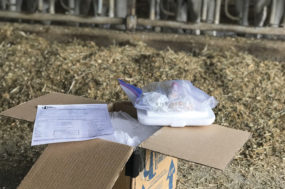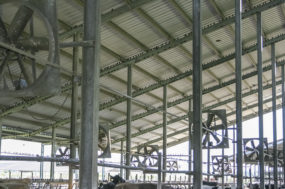Efficiency, animal welfare and cow longevity are driving forces in the development of today’s milking equipment. “Milking technology is moving rather rapidly in that direction,” Rosengren said.
Automated milking is one example of enhancing productivity and improving yield while incorporating efficiency and welfare. However, the farm’s management is just as important as the equipment.
“You also need to emphasize that it needs to be put into a professional content, in a professional farm design where you can take the total system into account. The more efficient you are, the less environmental footprint you have,” he said.
“I really appreciate those initiatives that have taken the full-scope view so that you start with the field and you can end with the field if you put the manure back again and put it to good use.”
When he looks around the globe, Rosengren’s biggest concerns for the dairy industry are environmental liabilities, huge inefficiencies and poor animal welfare situations.
As he leads this global company, Rosengren promotes sustainable dairy farming, which includes social responsibility, profitability, environmental responsibility and animal welfare responsibility.
About a decade ago, the company adopted the vision: “We make sustainable food production possible.”
“It’s important to realize that dairy farming is part of the food industry, and sustainability, now more than it was in 2011, is something that everyone is working with,” Rosengren said.
As the Food and Agriculture Organization of the United Nations (FAO) continues to evaluate greenhouse gas emissions from livestock, it found dairy products from modern farms were very competitive to other protein alternatives when compared based on the CO2 footprint per protein produced.
“Dairy, as a food item, has so many advantages and so many nutrients. It’s so important for the future of feeding the population of this globe that we need to [harvest it] in a smart way, and we need to do that in a better way into the future than in the past,” he said.
The company embraces this by pushing to do more with less and making sure its customers have the tools to increase productivity while remaining sustainable.
“It needs to be professional dairy farming, and we need to lift up or try to professionalize dairy farming in many parts of the world,” he said.
While there are many countries around the world moving toward a more industrialized dairy industry, Rosengren said the U.S. remains the role model for the continuous innovation and expansion of dairy practice.
“Working with DeLaval globally, you have to recognize that if you can make things work in the U.S., we can probably make that work in other countries as well,” he said.
For example, the adoption of heat detection systems to reduce days open has resulted in a smaller CO2 footprint and improved sustainability in the U.S.
Another industry improvement is the addition of sensors in both conventional and automated milking equipment to reveal a lot more information for managing cows.
“I think we will continue to develop milking technology toward higher yield and doing more with less,” Rosengren said.
He foresees milking equipment will have even more sensors and connected data collection ability. “I think the milking equipment is not going to be hardware only but a lot of software around it,” Rosengren said. The software will not only be able to present data but also conclusions from smart technology algorithms to make it easier for farmers to make the right decisions.
By advancing technologies and offering ways to improve farm efficiency, animal welfare and cow longevity across the globe, it will continue to impact the sustainability of our food production system. ![]()

-
Karen Lee
- Editor
- Progressive Dairy
- Email Karen Lee







